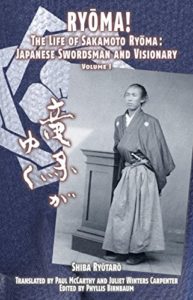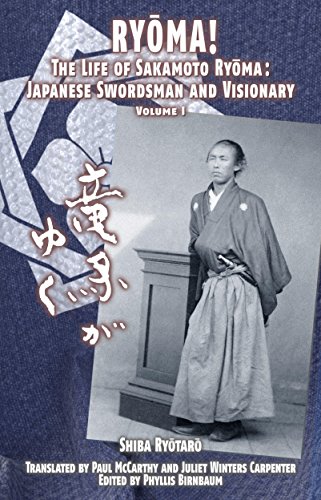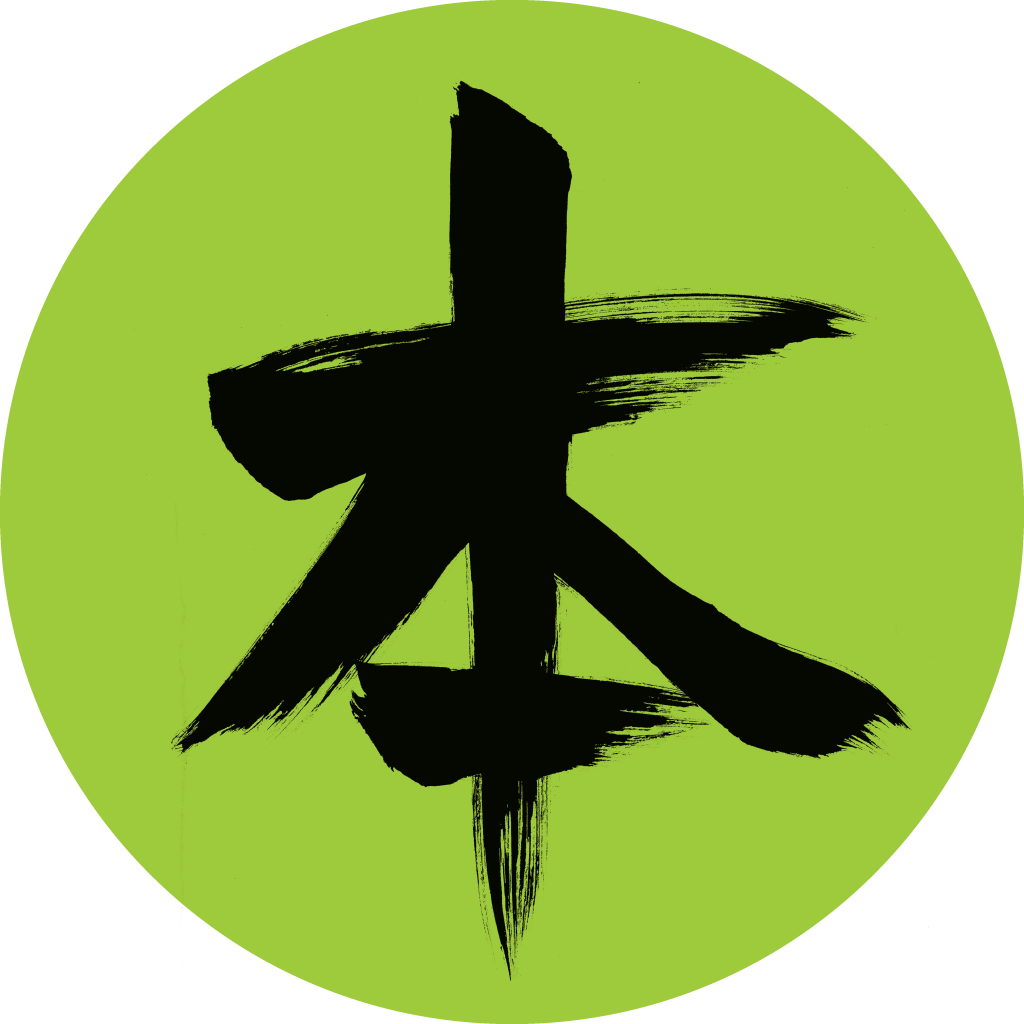

Support BOA by ordering Ryouma! The Life of Sakamoto Ryōma through these links:
Amazon U.S.
Thanks for helping support Books on Asia!

Note: This book is only available as an ebook and only on Amazon US.
“Ryouma!” is the translation of Ryōma ga yuku and tells the life story of Sakamoto Ryōma, a samurai and one of the great figures in the turmoil that engulfed Japan in the years before the 1868 Meiji Restoration. The novel is a masterwork by the prolific historical novelist Shiba Ryōtarō and has sold more than 24 million copies in Japan since publication in 1966—and still counting!
Excerpt from the Introduction by Henry D. Smith II:
Sakamoto Ryōma (1836-1867) was an intriguing figure in the turbulent years of crisis from 1853, when United States Commodore Matthew Perry came to demand trade relations with Japan, until the 1968 collapse of the Tokugawa military government and the return to direct imperial rule in the Meiji Restoration. Ryōma’s life was cut short by assassins in Kyoto in 1867, so his direct impact on the creation of the new government just weeks later was limited. In the century and a half since his death, however, various retellings of his life have made him far more influential in the minds of the Japanese people then if he had survived into the Meiji era. Of those retellings, none has been more important and more durable than Ryōma ga yuku, Shiba Ryōtarō’s great novel of 1962 – 1965, which appeared about a century after Ryōma’s death. It has never gone out of print in Japan, but only now, another half-century later, has it at last appeared in English in this fine translation.
It is important to grasp the critical dynamics. One was international, since Japan was suddenly faced with an unprecedented military and technological threat in the form of heavy armed steamships. Perry’s arrival is often described as an “opening” of Japan, a nation stereotypically depicted as enclosed in a state of “self-imposed isolation.” The description of Ryōma ga yuku in the English Wikipedia entry for “Shiba Ryōtarō,” for example, it asserts that “Japan banned international trade for over 200 years and isolated itself from the rest of the world.” Nothing could be further from the truth. The Japanese did not ban international trade, but rather restricted it to the Dutch and, more importantly, the Chinese, both of whom provided Japan with constant and broad access to trade objects and information from throughout the world. To be sure, the Tokugawa state carefully controlled foreign relations in the interests of internal stability, most notably by prohibiting Japanese citizens from traveling abroad. But as becomes clear in Ryōma ga yuku, Japanese at the time were well-informed about the rest of the world — and very curious to know more.
It was the precise military nature of the threat posed by the West that triggered the years of crisis, not the opening to international trade. Trade issues would indeed become critical, not because of the trade itself, but because Japan was denied control over its own trade by the unique “unequal treaties” that the West imposed first on China, then on Japan, resulting in economic disruptions that worked only to heighten the mounting internal political crisis. That crisis is the crucial story of the era, forcing the shogunate it to take measures to deal with the West. These measures in turn fomented anti-foreign sentiment, which was channeled into a demand to topple the Tokugawa regime and replace it with direct imperial rule; all of which was capitalized in the slogan “Revere the Emperor, Expel the Barbarians” (sonnō jōi). This complex dynamic, as readers quickly discover, provides the crucial context for Ryōma’s life.
About the Author: Shiba Ryōtarō (司馬 遼太郎 1923-1996) is one of Japan’s best-known writers, famous for his direct tone and insightful portrayals of historic personalities and events. He was drafted into the Japanese Army, served in the Second World War, and subsequently worked for the newspaper Sankei Shimbun. He is most famous for his numerous works of historical fiction. Ryōma! is one of Shiba’s masterworks and has been immensely popular since its publication in 1966.
About the Translators: Translated by Paul McCarthy and Juliet Winters Carpenter.
Juliet Winters Carpenter is a professor of English literature at Doshisha Women’s College of Liberal Arts and one of the foremost translators of Japanese literature working today. Her translations include Kobo Abe’s “Beyond the Curve,” Fumiko Enchi’s “Masks,” Ryotaro Shiba’s “The Last Shogun,” Jun’ichi Watanabe’s “A Lost Paradise,” and Machi Tawara’s “Salad Anniversary.” See Hon Podcast 03: Juliet Winters Carpenter Talks About Translating Japanese Literature.
